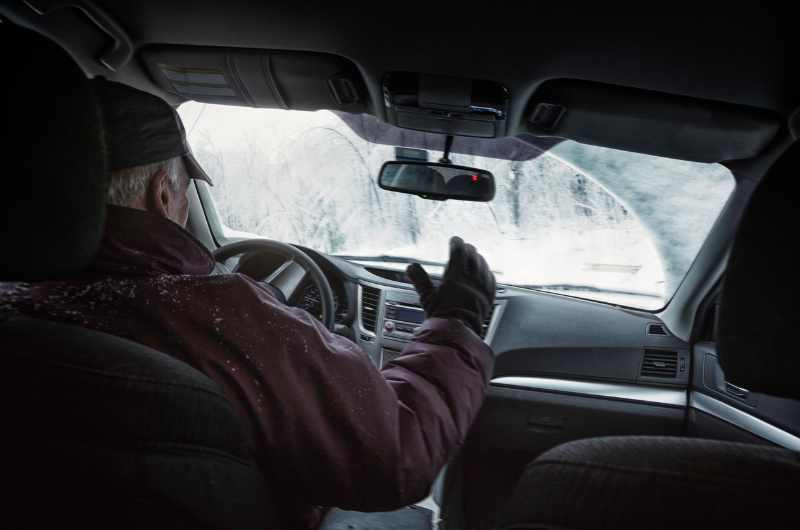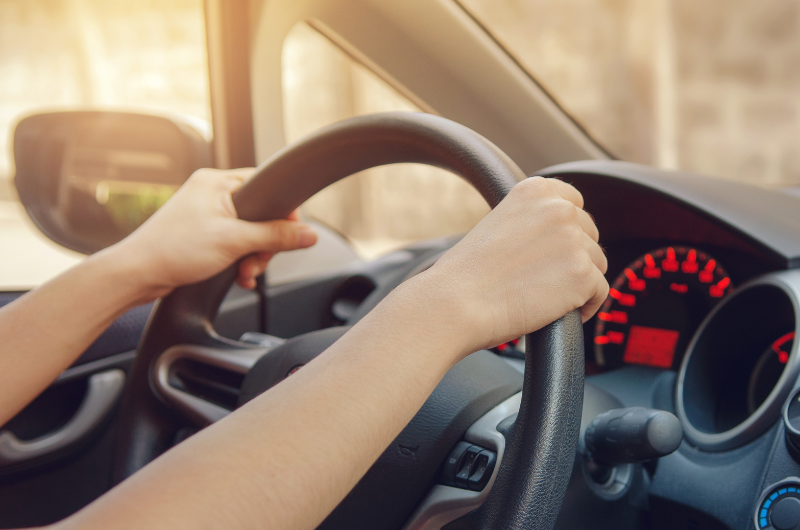When driving, the most important task a driver has is to keep control of the car at all times. Needless to say, sometimes difficult circumstances arise and this does not always happen. Perhaps there’s an emergency inside the car, perhaps the road conditions are bad, or perhaps another driver had a part to play in losing control of the car. Simple loss of control is the primary cause of single-car accidents and a major cause of other types, such as when somebody swerves into oncoming traffic.
Avoiding loss of control starts by understanding how it happens in the first place.
Causes of Loss of Control
Here are some of the primary causes of losing control of a vehicle:
Road Conditions
Dangerous road conditions include those caused by inclement weather. However, dangerous road surface conditions can also be caused by poor road maintenance, including potholes and missing guardrails.
The most common cause of a dangerous road surface, however, is heavy rain.
Distractions
There is a reason most states now ban talking or texting on a cell phone while driving. Drivers can also be distracted by a variety of things, including:
- Eating or drinking.
- Talking to a passenger.
- Moving objects or animals in the vehicle.
- A fussy child or animal.
- Using a navigation system.
- Messing with the entertainment system.
Any time a driver looks away from the road, there is a risk of losing control of the car and ending up in a car crash. According to the National Highway Traffic Safety Administration, about 3,000 people per year die as a result of somebody being distracted, and many of them are not in a vehicle. Younger drivers are more likely to become distracted.
Fatigue
One of the biggest causes of accidents is drowsy driving. It causes about 6,400 deaths and 328,000 crashes every year in the U.S. alone, and it's believed many deaths go unreported.
Driving while fatigued is the same as driving while drunk. If you have gone more than 20 hours without sleep, that's the equivalent of driving at the legal alcohol limit. Drowsy driving can also be caused by some prescription and even over-the-counter medications.
Car Malfunction
A malfunction of the car itself can also cause you to lose control of your vehicle. Brake failure is obviously one of the most common causes, but other mechanical failures that can cause accidents include:
- Defective tires. Tire punctures can also cause a loss of control.
- Worn suspension.
- Steering problems.
Malfunctions of automated systems such as advanced cruise control can potentially also cause an issue. Automated systems can also increase distracted driving if drivers become too reliant on them.
Inclement Weather
Bad weather conditions that can cause a loss of control include:
- Icy roads. Note that bridges may be icy when the main roadway is not. Weather conditions that hover around freezing are perfect for the creation of black ice, which matches the road color and can be very hard to see.
- Heavy rain can create a wet surface. This causes hydroplaning, where the car loses all grip. Due to how common it is, rain is the most dangerous weather condition.
- High winds. A high crosswind or gust can cause the car to go sideways across the road. Empty semis are the vehicle at most risk of losing control due to high winds, but high winds can affect SUVs and even passenger cars.
- Sand or debris. Debris on the road can cause you to lose control, or you might lose control while attempting to avoid the debris.
Inclement weather can be particularly hard to avoid.
Aggressive or Reckless Driving
This includes driving while under the influence of alcohol, marijuana, or other drugs. It also includes going too fast for the conditions, whether it's the type of road, the weather, or the levels of traffic.
Aggressive driving also includes road rage, where you become emotionally compromised and start to drive badly because you are angry at the actions of another driver.
Consequences of Loss of Control
.png?width=800&height=530&name=Untitled%20design%20(9).png)
Losing control of your car can cause significant consequences. Many car accidents are caused when one or more drivers lose control of their vehicles. You may end up hitting a wall or building, another vehicle, a pedestrian, or an animal (wild or domesticated). This can result in:
Injuries and Fatalities
When you lose control, you don't only endanger yourself and those in the car with you. An out-of-control car can also hit another vehicle, pedestrian, or cyclist, resulting in injuries or fatalities.
Property Damage
You can also do significant damage to your car if you hit another motor vehicle, an obstacle, or an animal. Hitting an animal can also result in injury or death of the animal, which can be emotionally traumatizing for everyone involved.
Legal Consequences
In some circumstances, you may face fines or even jail time for an accident that is ruled your fault, or if you were breaking the law, such as by drinking and driving or illegal cell phone use.
You may also be sued by the other driver involved. Even if your insurance company pays the damages, your premiums will go up.
Tips for Avoiding Loss of Control
Obviously, the best thing to do here is to avoid losing control in the first place. Also, always wear your seat belt, and if you do lose control, don't panic. Here are our tips for avoiding loss of control of the vehicle:
Keep Distractions to a Minimum
Avoid cell phone use while driving. If you must answer your phone, use a hands-free device. Do not text or email. If you are using a navigation system, use the audio function.
Try to hold off on eating and drinking until you reach a rest area. The same goes for changing the channel on the entertainment system, adjusting your mirrors, etc. Do these things before you start. Or, alternatively, have your front seat passenger handle everything.
Keep animals properly restrained in the back of the vehicle and teach children not to disturb you while you are driving.
Get Enough Rest Before Driving
Try to avoid driving on insufficient sleep. Avoid driving for more than 8 hours a day and take plenty of breaks, not just to run to the restroom, but actual breaks. Do not substitute caffeine for rest, although using it to improve alertness is safe for most people.
Do not drive if you have been awake for more than about 15 hours. Remember that at 20 hours, you are as impaired as if you were drunk. If switching off drivers, you should limit to less than eight hours each, even if you think you can sleep in the passenger seat.
Regularly Maintain Your Vehicle
Do all required maintenance on your vehicle. Check your tire pressure regularly and replace your car's tires promptly if worn or damaged. Do not drive on bald tires or if the brakes are not reliable. Ensure that your anti-lock brakes are working correctly and that the brake pedal is responsive.
Slow Down in Bad Weather
Always drive according to the weather conditions and slow down if the weather is inclement. Consider pulling over if you are uncomfortable with the conditions. If you have to regularly drive in snow or ice, know what to do with the steering wheel and gas pedal if your car goes into a skid. Learn how to do a correct emergency brake so you can get back in a straight line and regain control.
Avoid Aggressive or Reckless Behavior
Keep your emotions under control while driving. Don't drive while under the influence of alcohol, marijuana, or other drugs. If you are starting a prescription, see how it affects you before driving.
What To Do After Losing Control
So, what do you do if the worst happens and you do lose control of your vehicle? First of all, make sure everyone is okay. If medical attention is needed, call for an ambulance. You should also consider calling the police and/or a tow truck. Always call the police if you have hit a wild or domestic animal that is still alive.
If other drivers are involved, exchange information with them.
Legal Considerations After Losing Control of Your Car
You should report the incident immediately to your insurance company, regardless of who's fault it is. Do not sign a disclaimer until you have talked to a lawyer. Always cooperate with the police. If you believe someone else was at fault or are not sure, consider seeking legal advice from an accident attorney.
If you have questions about a car accident, contact Palermo Law Group today for a free consultation.


